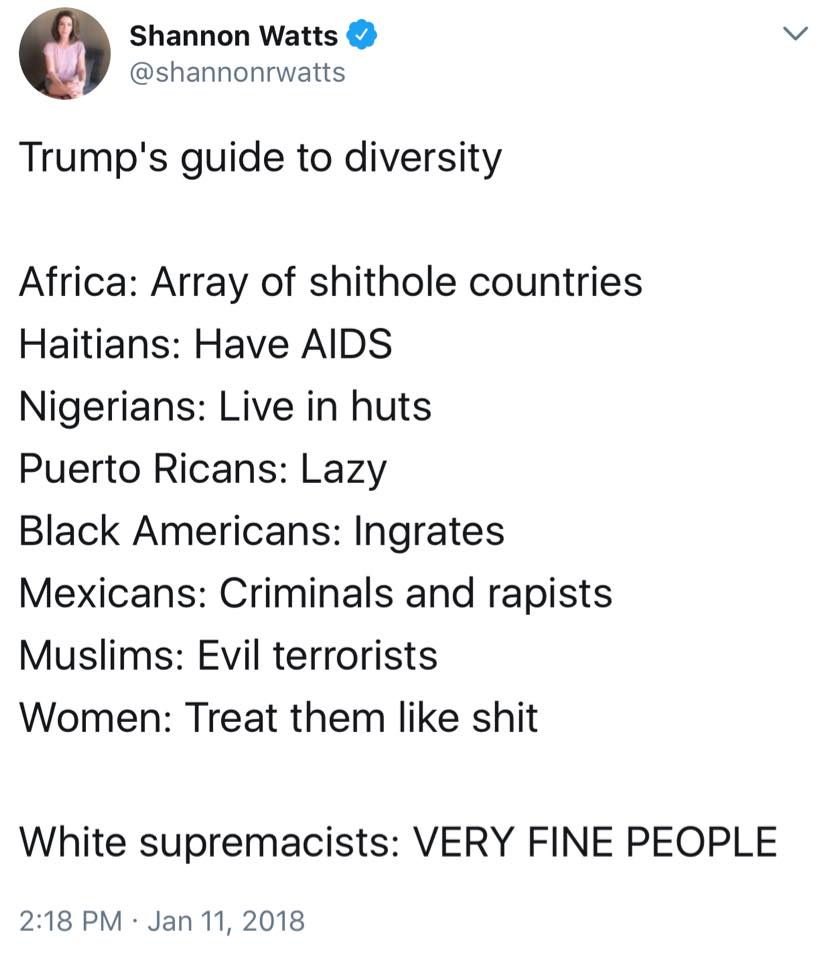
|
Spring 2018 National Immigrant Solidarity Network Monthly News Digest and News Alert! National Immigrant Solidarity Network URL: http://www.ImmigrantSolidarity.org Information about the Network: FLYER Washington D.C.: (202)595-8990 Every Donation Counts! Please Support Us! Send check pay to: |
|
Spring 2018 U.S. Immigrant
Alert! Newsletter Please Download Our Newsletter: http://www.immigrantsolidarity.org/Newsletter/Spring18.pdf [Requires Adobe Acrobat, to download, go: http://www.adobe.com] |
|---|
Support DACA, Support Clean DREAM Act, No to the Border Wall, Racist Trump's Shithole Rhetoric! |
In This Issue: 1) Trump's attacks on humanitarian immigration just became a full-blown war (Pg 1) |
|---|
Please download
our latest newsletter: http://www.immigrantsolidarity.org/Newsletter/Spring18.pdf
1/9: Trump's attacks on humanitarian immigration just became a full-blown war
He's trying to force 260,000 immigrants to return to El Salvador after decades in the United States
Dara Linddara Vox.com
On Monday, the Trump administration announced that it was stripping approximately 260,500 Salvadoran immigrants — who’ve been in the US for at least 17 years, since a 2001 earthquake — of temporary legal status as of July 2019.
It’s the latest, and most significant, blow in the administration’s fight against Temporary Protected Status, an immigration program that lets the government allow immigrants to stay in the US and work legally after their home countries are struck by natural disasters or war.
El Salvador is the fourth country for which the Trump administration has announced an end to TPS protections over its first year. In total, the administration has set up more than 320,000 immigrants to lose their legal status over the course of late 2018 and 2019 (and possibly as many as 375,000, depending on what it decides to do with 57,000 Honduran immigrants this spring).
The overwhelming majority of those immigrants have deep roots in the US. And Salvadorans might have the deepest roots of all: Approximately 192,700 US-born children have at least one parent who’s on track to lose legal status due to the administration’s Monday announcement.
The Trump administration argues that the TPS program was never intended to allow immigrants to stay for 17 years, and that it needs to end temporary status to provide a “permanent solution.” But it’s unclear, at best, that the Trump administration will be interested in pushing Congress to legalize hundreds of thousands of Central American (and Haitian) immigrants. Furthermore, the administration is telling Salvadoran immigrants that they have 18 months to make other arrangements to stay in the US or pack their bags.
After two decades in the US, hundreds of thousands of families will now have to decide whether to return to one of the most violent countries on earth — or remain in the US as unauthorized immigrants and try to slink into the shadows.
No president wanted to end humanitarian immigration. Then came Donald Trump.
Temporary Protected Status serves as a form of humanitarian relief, offered to nationals of countries struggling with the aftermath of war, natural disasters, or other humanitarian crises where conditions on the ground make it difficult for people to return safely. Ten countries — El Salvador, Haiti, Honduras, Nepal, Nicaragua, Somalia, Sudan, South Sudan, Syria, and Yemen — are currently in the program, which is overseen by the Department of Homeland Security and is granted in six- to 18-month intervals that can be renewed as long as DHS deems a designation necessary.
El Salvador was on the TPS list in the 1990s during its long and bloody civil war, but was removed in 1992 (though a related program, Deferred Enforced Departure, protected Salvadorans from getting deported through 1995). In 2001, though, after an earthquake struck El Salvador, the government allowed Salvadorans in the US to apply for TPS again. In the intervening 17 years, it’s renewed protections 10 times.
To enter the program, nationals of a designated country must clear a number of conditions: They must maintain a relatively clean criminal record and pass a background check, they must pay a $495 processing fee when they first apply for the program and every time their status is renewed, and they must reside in the United States at the time of their country’s designation. This usually means that TPS beneficiaries are undocumented immigrants who were already in the US, those who overstayed a visa, or those who hold some other form of temporary immigration status.
TPS beneficiaries are granted authorization to work in the US (and in some cases the ability to travel internationally) and a reprieve from deportation. But outside of that, TPS doesn’t grant many other benefits; beneficiaries do not have legal permanent resident status, and while a small number of beneficiaries may be eligible for green cards through the sponsorship of a US citizen family member, the program is not intended to provide a path to citizenship.
In practice, that meant that once a country’s TPS was up for review, presidents had two choices: They could renew TPS for that country, kicking the can down the road; or they could terminate it and give thousands of people no way to stay legally in the US.
Unsurprisingly, most presidents chose the former. But equally unsurprisingly, the Trump administration is taking the opposite approach. With six opportunities to extend TPS over its nine months in office, it’s fully extended one of them — South Sudan — while terminating three countries’ protections on delays and offering six-month punts twice (Honduras and the initial six-month extension for Haiti).
Over its first year in office, the Trump administration has made it clear that it wants to completely overhaul the basis on which the US grants legal status to immigrants. It envisions a “merit-based” immigration system in which individual immigrants are selected based on their high level of education and relevant professional skills — and the government has no obligation to let immigrants come to or stay in the US just because their homes and families are already here.
There are a lot of current US immigration policies that run afoul of the Trump administration’s ideas of merit, but TPS might be the biggest affront to their vision. Not only does it extend legal protections to people based almost entirely on what’s happened in their home countries, rather than what they can contribute as individuals, but it applies to people who were already living in the US when TPS was granted — instead of allowing the US to select immigrants in advance.
But the fundamental problem, from the Trump administration’s point of view, is that TPS is designed to be temporary, and a temporary program shouldn’t be leading people to settle in the US.
To that end, the administration has taken nearly every chance it’s gotten to wind down TPS protections. In September, it announced that it was giving about 500 Sudanese a final 18 months on TPS. In November, it hit 59,000 Haitian immigrants and 2,500 Nicaraguan immigrants with the same 18-month deadline. (It was unable to come to a decision about the fate of 57,000 Honduran immigrants, forcing an automatic six-month extension, which will expire this spring.) And now it’s doing the same for what it estimates to be 260,500 Salvadorans.
The Trump administration thinks El Salvador is too dangerous to take immigrants from, but too safe to qualify for TPS
The statute creating TPS tells the secretary to look at “conditions in the foreign state” when making decisions about TPS. The Trump administration’s review, it claims, found that El Salvador has recovered sufficiently from the 2001 earthquake to be a safe place to send hundreds of thousands of immigrants back to. And on a press call Monday, senior administration officials pointed to the “repatriation” of tens of thousands of Salvadorans from the US in recent years as evidence that the Salvadoran government can successfully reintegrate people.
This is not exactly the way the Trump administration tends to describe El Salvador. The country is the home base of MS-13 — the transnational gang Trump has referred to as “monsters,” and which he and his top officials use to argue for everything from tightening asylum laws to defunding cities that don’t maximize compliance with federal immigration agents. In fact, the administration has bragged about how many MS-13 gang members it has deported to El Salvador — the very same people it’s now claiming are proof of the country’s ability to absorb returned immigrants.
In 2015 (the most recent year for which data is available from United Nations Office of Drugs and Crime), El Salvador had 108.64 homicides per 100,000 people. That made it the deadliest country in the world by a wide margin — the next most dangerous, Honduras, had 63.75 homicides per 100,000 — and 22 times as dangerous as the United States.
El Salvador is slightly safer than it was in 2015. In January 2017, the country had its first day without a murder in two years. But by fall, violence was spreading again: In September, the country witnessed 435 homicides, or almost 15 per day.
American policy has deeply shaped El Salvador’s recent past anyway. The US supported one of the sides in the civil war that led to the country’s original TPS grant. In the 1990s, efforts to deport immigrants who had been convicted of crimes played a major role in exporting MS-13 — which started as a Los Angeles prison gang — to El Salvador, where it took root.
More recently, the flow of Salvadorans seeking asylum in the US, usually out of fear of violence from MS-13 or other gangs, is disproportionately made up of unaccompanied children and families — in part because of US laws offering guarantees for standards of treatment (and, in the case of unaccompanied children, options for legal status) that aren’t available to single adults. (This has been cited by some Republicans as a reason to change those laws, so as not to “incentivize” children or families fleeing violence to come to the US.)
The Trump administration’s line on TPS is that it’s not about the broader stability of a country, but just about recovery from the initial disaster. But the federal government has the authority to grant or extend TPS based on “ongoing armed conflict” or “other extraordinary temporary conditions.” Asked on Monday about those criteria, a senior administration official simply said it did not believe those conditions applied to El Salvador in 2018.
The Trump administration is attempting to deny — or simply ignore — that the people they’re stripping of status have deep roots in the US
It’s not even that Salvadoran immigrants are now being pushed to return to the same gang violence they fled to come to the US. By definition, every Salvadoran immigrant with TPS has been here for at least 17 years — before the homicide rate skyrocketed. As of January 2017, according to an estimate from the Center for Migration Studies, 51 percent of Salvadorans with TPS had been in the US at least 20 years.
Salvadorans aren’t just the biggest population of those with TPS; they’re also the best integrated. According to the CMS estimates, 85 percent speak some English, with 48 percent speaking English “well, very well,” or exclusively. Their labor force participation rate is 88 percent — above the US average of 63 percent — and their unemployment rate is 5 percent. There are 45,000 mortgages held in the names of Salvadoran TPS holders. TPS holders make up a substantial portion (16 percent) of all Salvadorans in the US.
From the administration’s perspective, all of this is a sign that previous presidents screwed up, by allowing TPS protections to continue after the initial disaster that spurred them faded into the past. But its relentlessly narrow focus leaves out a large group of US citizens: the 192,700 children who have been born in the US to at least one parent who is a Salvadoran with TPS.
Most of these children are almost certainly under the age of 21 (the age at which they’d be able to sponsor their parents for green cards, under certain circumstances). Those TPS holders who were eligible for legal status have probably already gotten it — University of Kansas professor Cecilia Menjívar estimates that tens of thousands of Salvadoran immigrants got TPS in 2001 but no longer have it (presumably because they’ve gotten permanent legal status or left the country).
When a reporter asked on Monday whether the Trump administration was telling parents with TPS to take their US-born, US citizen minor children to El Salvador, the senior administration official said, “We’re not getting involved in individual family decisions.”
DHS Secretary Kelly Testifies Before Senate Appropriations Committee On Budget
Pushing hundreds of thousands of people back into the shadows in the name of a “permanent” solution
As the Trump administration has ended TPS for country after country, it’s started to emphasize that it’s up to Congress to find a “permanent solution” to address the fate of the people it’s stripping of legal status. Because TPS was never intended to be permanent — and because it doesn’t itself provide a pathway for people to become permanent residents — the administration maintains that if Congress decides that these 260,000 Salvadoran immigrants (and the 62,000 other immigrants whom it’s stripping of TPS in the next year and a half) should stay in the US, it’s up to Congress to let them apply for green cards.
There’s a difference between telling Congress to come up with a solution and actually pressuring it to do so. The administration hasn’t endorsed any bills to grant permanent status to TPS holders; the only immigration bill it has endorsed, the RAISE Act, would slash legal immigration instead of opening up new pathways for it.
And, of course, the administration has already pulled a move like this before. When it announced in September it was winding down the Deferred Action for Childhood Arrivals program, Trump claimed he was giving Congress six months to find a “permanent solution” for the 700,000 immigrants protected from deportation under DACA; with less than two months left, negotiations are nearly at a standstill, in large part due to the administration’s apparent insistence on getting its entire immigration agenda passed as part of a DACA deal.
If the administration really does think that a “permanent solution” that will allow Salvadorans to stay in the US is forthcoming, it’s not telling Salvadorans that. The purpose of delaying the end of TPS by 18 months, the administration says, is to give current TPS holders time to adjust to permanent status if eligible — and to make arrangements to leave the US if not.
Eighteen months may seem like a long time. But for people who’ve been in the US for 18 years — with children who’ve never lived anywhere else — that may not be nearly enough.
The immigrants facing the loss of TPS have another option the administration didn’t specify (and that it doesn’t tend to acknowledge). They can remain in the US after their legal status expires, becoming unauthorized immigrants. They’d join the 11 million current unauthorized immigrants, many of whom were under little risk of deportation in the final years of the Obama administration and now have to deal with the fear of ICE apprehension on a daily basis. They’d join the other tens of thousands of immigrants who will have lost TPS and stayed. And they’ll join, unless Congress has come up with a bill in time, the 700,000 US-raised immigrants who are at risk with the end of DACA.
The Trump administration says it wants permanent solutions. But in its first year, its immigration legacy has been to move more and more people into contingency and vulnerability.Link the article:
Part One:
http://www.immigrantsolidarity.org/cgi-bin/datacgi/database.cgi?file=Issues&report=SingleArticle&ArticleID=1856
2/8: US immigration and customs agency seeks to join Intelligence Community
Joseph Fitsanaks – Intel News
The United States Immigration and Customs Enforcement (ICE) is reportedly seeking to join the Intelligence Community, which includes the Central Intelligence Agency, the Defense Intelligence Agency, and other intelligence-focused arms of the federal government. Currently, ICE is a federal law enforcement that operates under the umbrella of the Department of Homeland Security. It consists of two components: Homeland Security Investigations, which probes cross-border criminal activity, including drugs and weapons trafficking, money laundering and cybercrime; and Enforcement and Removal Operations, whose mission is to find and capture undocumented aliens.
But some senior ICE officials have been exploring the possibility of joining the US Intelligence Community. According to The Daily Beast, which reported the alleged plans, the officials believe that by joining the Intelligence Community, ICE will become privy to intelligence that will assist in its mission. They also claim that membership in the Intelligence Community would afford ICE “greater prestige, credibility and authority” within the federal government. The Daily Beastreports that ICE’s effort to join the Intelligence Community began during the administration of US President Barack Obama. However, it has picked up steam following the election of President Donald Trump. Some believe that President Trump would be willing to sign an executive order that would incorporate ICE in the Intelligence Community.
Some civil liberties watchdogs, however, are weary of such plans. They claim that ICE is a domestic law enforcement agency and should not have access to practices and techniques used by spy agencies like the CIA or the National Security Agency. The latter frequently break the laws of foreign countries in pursuit of their mission, which is to steal foreign intelligence. These agencies are characterized by a different culture, say critics, which is not respectful of legal constraints. But supporters of ICE’s proposed inclusion into the Intelligence Community argue that there are several law enforcement agencies that are already members of the Intelligence Community. Notably, the Federal Bureau of Investigation and the Drug Enforcement Administration —both law enforcement agencies— belong to the Intelligence Community.
The Daily Beast said it contacted ICE but a spokesperson refused to comment on the story. The Department of Homeland Security did not return emails and phone calls about the proposal to include ICE in the Intelligence Community.Link the article:http://www.immigrantsolidarity.org/cgi-bin/datacgi/database.cgi?file=Issues&report=SingleArticle&ArticleID=1863
1/25: Trump Exploits Dreamers to Fulfill Stephen Miller's White Supremacist Wish List
Church World Service
Washington, D.C. - CWS strongly condemns the White House’s supposed immigration “reform” memo leaked earlier this evening. Stephen Miller’s plan reverses President Trump’s earlier commitment to sign a legislative solution for Dreamers. It would hold hostage a pathway to citizenship for some Dreamers by stopping U.S. citizens from sponsoring their parents, siblings, and even children; supercharging a deportation force that is already wildly out of control; and spending $25 billion on a wasteful border wall..
“This White House proposal is immoral, and in no way a serious attempt to pass a legislative solution for Dreamers. With this memo, President Trump has demonstrated that he cannot lead but will allow Stephen Miller and other white supremacists to dictate his policies. The administration is continuing to wage its war on immigrants, this time by exploiting dreamers and redefining family. This is part and parcel of a xenophobic and white supremacist agenda. Dreamers are Americans—and it’s time for Congress to recognize that fact. 87% of the American public already does,” said Rev. John L. McCullough, President and CEO of Church World Service.
“After President Trump ended the Deferred Action for Childhood Arrivals (DACA) program, he pledged to sign a bipartisan solution for Dreamers. Now, he is going back on that promise and demanding the restrictionist portion of comprehensive immigration reform in exchange for a Dreamer solution for which he has already pledged support. This exploitation of Dreamers' predicament - a plight which President Trump has caused - calls to mind Matthew 18:6, in which Jesus proclaims If any of you put a stumbling block before one of these little ones, it would be better for you if a great millstone were fastened around your neck and you were drowned in the depth of the sea. There is already broad bipartisan consensus on a solution for Dreamers - Congress must not bow to Stephen Miller’s white supremacist agenda that will dismantle the very values upon which this nation was founded.”
CWS urges the public to call their Members of Congress and demand that Congress reject this White House proposal and instead pass a clean DREAM Act now.
Link the article:http://www.immigrantsolidarity.org/cgi-bin/datacgi/database.cgi?file=Issues&report=SingleArticle&ArticleID=1860
We are calling A national day of multi-ethnic unity with youth, labor, peace and justice communities in solidarity with immigrant workers and building new immigrant rights & civil rights movement! Fight Against Trump’s Racist Anti-Immigrant Agenda! Wear White T-Shirt, organize local actions to support immigrant worker rights! 1. No to anti-immigrant legislation, and the criminalization of the immigrant communities. We encourages everyone to actively linking our issues with different struggles: wars in Africa, the Americas, Asia, Iraq, Afghanistan, Palestine & Korea with sweatshops exploitation in Asia as well as in Los Angeles, New York; international arm sales and WTO, FTAA, NAFTA & CAFTA with AIDS, hunger, child labors and child solider; as well as multinational corporations and economic exploitation with racism and poverty at home—in order we can win the struggle together at this May Day 2018! Please send your local May Day 2018 Action Information to : ActivistWeb@gmail.com Lee Siu Hin - National Immigrant Solidarity Network
|
|---|
June 1-12, 2018 US Activist to China Delegation: Silk Road, One Road One Belt Study Delegation (12 Days) |
|---|
Friday June 1, 2018 – Tuesday, June 12, 2018
Cost: $1700USD (Plus US-China Airfare)
Projects of National Immigrant Solidarity Network (NISN) and Action LA Network
Fiscal sponsorships of Alliance for Global Justice
http://www.ChinaDelegation.org
 \
\
U.S. Activist Solidarity Delegation to China, organized by National Immigrant Solidarity Network and Action LA Network, come to join our 12-days exciting social and cultural study delegation to go to Beijing + historical Silk Road cities: Xian, Dunhuang, and Urumqi, understand history and diverse background, as well as how China's One Road One Belt initiative will affect the World and migration.
Contact Us:
By: E-Mail (Best) ActivistWeb@gmail.com |
By: Internet (Web Chat) |
By: Phone |
Also Read..
12/3: US pulls out of UN pledge to protect migrants as Europe struggles with refugee tide
http://www.immigrantsolidarity.org/cgi-bin/datacgi/database.cgi?file=Issues&report=SingleArticle&ArticleID=1864
1/8: Activists Demand Freeholders and County Executive End Immigrant Detention in Newark
http://www.immigrantsolidarity.org/cgi-bin/datacgi/database.cgi?file=Issues&report=SingleArticle&ArticleID=1854
1/8: Climate Change, Mass Migration and the Border Militarization to Come
http://www.immigrantsolidarity.org/cgi-bin/datacgi/database.cgi?file=Issues&report=SingleArticle&ArticleID=1855
1/9: Trump’s attacks on humanitarian immigration just became a full-blown war (1)
http://www.immigrantsolidarity.org/cgi-bin/datacgi/database.cgi?file=Issues&report=SingleArticle&ArticleID=1856
1/9: Trump’s attacks on humanitarian immigration just became a full-blown war (2)
http://www.immigrantsolidarity.org/cgi-bin/datacgi/database.cgi?file=Issues&report=SingleArticle&ArticleID=1857
1/13: Trump, condemned for ****hole countries remark, denies comment but acknowledges ‘tough’ language
http://www.immigrantsolidarity.org/cgi-bin/datacgi/database.cgi?file=Issues&report=SingleArticle&ArticleID=1858
¡Arriba! Las Vegas Worker Center launches in the Trump era
http://www.immigrantsolidarity.org/cgi-bin/datacgi/database.cgi?file=Issues&report=SingleArticle&ArticleID=1859
1/25: Trump Exploits Dreamers to Fulfill Stephen Miller’s White Supremacist Wish List
http://www.immigrantsolidarity.org/cgi-bin/datacgi/database.cgi?file=Issues&report=SingleArticle&ArticleID=1860
1/30: Leaked Memo Reveals Trump’s Gift to Private Prison Companies
http://www.immigrantsolidarity.org/cgi-bin/datacgi/database.cgi?file=Issues&report=SingleArticle&ArticleID=1861
1/31: Immigration authorities detail plan for courthouse arrests
http://www.immigrantsolidarity.org/cgi-bin/datacgi/database.cgi?file=Issues&report=SingleArticle&ArticleID=1862
2/8: US immigration and customs agency seeks to join Intelligence Community
http://www.immigrantsolidarity.org/cgi-bin/datacgi/database.cgi?file=Issues&report=SingleArticle&ArticleID=1863
2/14: White House won’t discuss immigration status of Melania Trump's parents
http://www.immigrantsolidarity.org/cgi-bin/datacgi/database.cgi?file=Issues&report=SingleArticle&ArticleID=1865
2/23: Border Patrol Agent-Turned-Author Meets Protests in California
http://www.immigrantsolidarity.org/cgi-bin/datacgi/database.cgi?file=Issues&report=SingleArticle&ArticleID=1866
2/24: ‘The Snake’: How Trump Appropriated a Radical Black Singer’s Lyrics for Immigration Fearmongering (1)
http://www.immigrantsolidarity.org/cgi-bin/datacgi/database.cgi?file=Issues&report=SingleArticle&ArticleID=1867
2/24: ‘The Snake’: How Trump Appropriated a Radical Black Singer’s Lyrics for Immigration Fearmongering (2)
http://www.immigrantsolidarity.org/cgi-bin/datacgi/database.cgi?file=Issues&report=SingleArticle&ArticleID=1868
3/13: Visit Las Vegas Worker’s Center
http://www.immigrantsolidarity.org/cgi-bin/datacgi/database.cgi?file=Issues&report=SingleArticle&ArticleID=1869
Please download our latest newsletter: http://www.immigrantsolidarity.org/Newsletter/Spring18.pdf
Past National Immigrant Solidarity Netowrk Newsletters Spring 2017 | Summer2017 | Fall 2017 | Winter 2017 | Spring 2016 | Summer 2016 | Fall 2016 | Winter 2016 | Spring 2015 | Summer 2015 | Fall 2015 | Winter 2015 | Spring 2014 | Summer 2014 | Fall 2014 | Winter 2014 | Spring 2013 | Summer 2013 | Fall 2013 | Winter 2013 | Fall 2012 |Spring 2012 | Summer 2012 | Winter 2011 | Summer 2011 | Fall 2011 | November 2011 | Spring 2011 | September - October 2009 | Spring 2010 | Fall 2010 | October-Novermber 10 May - June 2009 | March - April 2009 | January - February 2009 | November - December 2008
|
|---|
Useful Immigrant Resources on Detention and Deportation
Immigrants Shape California: New "Access to Justice" Laws
http://www.immigrantsolidarity.org/cgi-bin/datacgi/database.cgi?file=Issues&report=SingleArticle&ArticleID=1688
ICE custody program and its budget
http://www.immigrantsolidarity.org/cgi-bin/datacgi/database.cgi?file=Issues&report=SingleArticle&ArticleID=1699
Refugee Appropriations Docs & Resources
http://www.immigrantsolidarity.org/cgi-bin/datacgi/database.cgi?file=Issues&report=SingleArticle&ArticleID=1702
Immigration Bond: How to Get Your Money Back (1)
http://www.immigrantsolidarity.org/cgi-bin/datacgi/database.cgi?file=Issues&report=SingleArticle&ArticleID=1708
Immigration Bond: How to Get Your Money Back (2)
http://www.immigrantsolidarity.org/cgi-bin/datacgi/database.cgi?file=Issues&report=SingleArticle&ArticleID=1709
Face Sheet: Immigration Detention--Questions and Answers (Dec, 2008) by: http://www.thepoliticsofimmigration.org
Thanks for GREAT works from Detention Watch Network (DWN) to compiled the following information, please visit DWN website: http://www.detentionwatchnetwork.org
Tracking
ICE's Enforcement Agenda
Real
Deal fact sheet on detention
Real
Deal fact sheet on border
- From
Raids to Deportation-A Community Resource Kit
- Know Your Rights in the Community (English,
Spanish)
- Know
Your Rights in Detention
- Pre-Raid
Community Safety Plan
- Raids
to Deportation Map
- Raids
to Deportation Policy Map
More on Immigration Resource Page
http://www.immigrantsolidarity.org/resource.htm
Immigrants and their supporters are participating in marches all over the country to protest proposed national legislation and to seek justice for immigrants. The materials available here provide important information about the rights and risks involved for anyone who is planning to participate in the ongoing marches.
If government agents question you, it is important to understand your rights. You should be careful in the way you speak when approached by the police, FBI, or INS. If you give answers, they can be used against you in a criminal, immigration, or civil case.
The ACLU's publications below provide effective and useful guidance in several languages for many situations. The brochures apprise you of your legal rights, recommend how to preserve those rights, and provide guidance on how to interact with officials.
IMMIGRATION
Know Your Rights When Encountering Law Enforcement
| Conozca Sus Derechos Frente A Los Agentes Del Orden Público
ACLU of Massachusetts - Your Rights And Responsibilities If You Are Contacted By The Authorities English | Spanish | Chinese
ACLU of Massachusetts - What to do if stopped and questioned about your immigration status on the street, the subway, or the bus
| Que hacer si Usted es interrogado en el tren o autobus acerca de su estatus inmigratorio
ACLU of South Carolina - How To Deal With A 287(g)
| Como Lidiar Con Una 287(g)
ACLU of Southern California - What to Do If Immigration Agents or Police Stop You While on Foot, in Your Car, or Come to Your Home
| Qué Hacer Si Agentes de Inmigración o la Policía lo Paran Mientras Va Caminando, lo Detienen en su Auto o Vienen a su Hogar
ACLU of Washington - Brochure for Iraqis: What to Do If the FBI or Police Contact You for Questioning English | Arabic
ACLU of Washington - Your Rights at Checkpoints at Ferry Terminals
| Sus Derechos en Puestos de Control en las Terminales de Transbordadores
LABOR / FREE SPEECH
Immigrant Protests - What Every Worker Should Know:
| Manifestaciones de los Inmigrantes - Lo Que Todo Trabajador Debe Saber
PROTESTERS
ACLU of Florida Brochure - The Rights of Protesters
| Los Derechos de los Manifestantes
STUDENTS
Washington State - Student Walkouts and Political Speech at School
| Huelgas Estudiantiles y Expresión Política en las Escuelas
California Students: Public School Walk-outs and Free Speech
| Estudiantes de California: Marchas o Huelgas y La Libertad de Expresión en las Escuelas Públicas
Please Subscribe to
the US Immigration Alert Newsletter!
A Monthly Newsletter from National Immigrant Solidarity Network
1 year subscription rate (12 issues) is $35.00
It will help us pay for the printing costs, as well as funding for the
NISN projects (additional donations to the NISN is tax deductible!)
Check pay to: NISN/AFGJ
National Immigrant Solidarity Network
P.O. Box 751
South Pasadena, CA 91031-0751
Please
Join Our Mailing Lists!
- Daily email update:
The National Immigrant Solidarity Network daily news litserv
to join, visit web: http://lists.riseup.net/www/info/isn
or send e-mail to: isn-subscribe@lists.riseup.net
- Regional listservs:
Asian American Labor Activism Alert! Listserv
send-e-mail to: api-la-subscribe@lists.riseup.net
or visit: http://lists.riseup.net/www/info/api-la
New York, New Jersey, Connecticut and Pennsylvania areas immigrant workers information and alerts
send e-mail to: nyc-immigrantalert-subscribe@lists.riseup.net or e-mail request to: info@immigrantsolidarity.org
or visit: http://lists.riseup.net/www/info/nyc-immigrantalert
Virginia state-wide immigrant organizing E-mail list
send- e-mail to: va-immigrantrights-subscribe@lists.riseup.net
or visit: https://lists.riseup.net/www/info/va-immigrantrights
US-Mexico Border Information: No Militarization
of Borders! Support Immigrant Rights!
send e-mail to: Border01-subscribe@yahoogroups.com
or visit: http://groups.yahoo.com/group/Border01/
Immigrant Deportation and Detention Alert!
send e-mail to: isn-deportees-subscribe@lists.riseup.net
Chicago/Midwest/Great Lake Region Immigrant List
send e-mail to: chicago-immigrantrights@lists.riseup.net
or visit: https://lists.riseup.net/www/info/chicago-immigrantrights
Please Donate to National Immigrant Solidarity Network!
All Donations Are Tax Deductible!
Make check payable
to NISN/AFGJ and it will be tax deductible!
Send your check to:
National Immigrant Solidarity Network
P.O. Box 751
South Pasadena, CA 91031-0751
Los Angeles, California 90048
____ $100.00 ____ $ 50.00 ____ $ 35.00 ____ Other Amount $___________
($35 or more will receive 1 year free subscriptions of
the Immigration Alert! Newsletter Print Edition)
Donate On-Line: https://org2.salsalabs.com/o/7315/donate_page/actionla-nisn
Every Donation Counts! Please Support Us!




